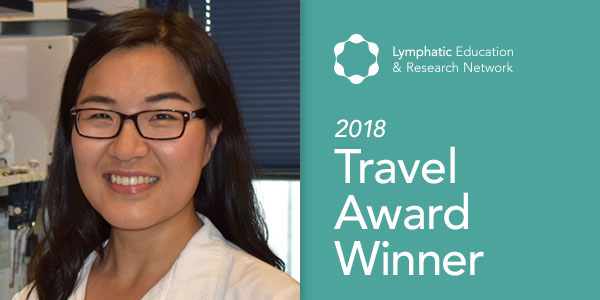A guest blog post by Xiaolei Liu, Ph.D., a 2018 LE&RN Travel Award winner.
Xiaolei Liu, Ph.D., currently a research trainee at the Northwestern University, Chicago, IL, US, under the supervision of Dr. Guillermo Oliver received a Travel Award from LE&RN to attend the 20th International Vascular Biology Meeting (IVBM) in Helsinki, Finland. We asked Xiaolei Liu to share her thoughts on that experience with us and to tell us a bit about her research and future plans.
IVBM experience
The 20th IVBM had a broad range of interesting topics within vascular biology fields from development and inflammation to therapeutic views. I experienced unpublished cutting-edge studies and got to know leading scientists in the vascular biology field. It expanded my knowledge about the field and provided me with a great opportunity for future collaboration.
Research areas of interest
As a developmental biologist, my research is focused on how lymphatic endothelial cells (LECs) form functional lymphatic vessels. I was able to identify Rasip1, a Ras interacting protein as a key player in lymphatic vessel maintenance during development and regeneration. This study is very important as lymphatic vessels play important roles in a series of disease conditions, such as tumor metastasis, lymphedema, and heart injuries. Understanding how lymphatic vessel forms could provide potential therapeutic tools to treat lymphatic-related diseases.
Career and research plans
During my postdoctoral training with Dr. Oliver, I have characterized the molecular mechanisms of how LECs form functional vessels. At the late stage of my training, I have challenged myself to incorporate my current expertise in lymphatic development into my previous training in cardiovascular diseases to study the functional roles of lymphatic vessels in heart diseases. My ultimate career goal is to become an independent scientist and make important original and novel contributions in the field of lymphatic and cardiovascular biology, and help to mentor and train a new generation of scientists.
Lymphatic research has drawn more and more attention in the past 20 years, partly thanks to the support provided by LE&RN. As a result, many genes and pathways that regulate/affect lymphatic functions have been characterized. I hope that with the help of LE&RN, in partnership with leading researches, the lymphatic field will receive even more funding opportunities and recognition, encouraging scientists to develop novel therapeutic strategies for human lymphatic diseases.
LE&RN programs, like LE&RN Travel Awards, are only possible because of our Partners and Supporting Members. Become a Supporting Member today.

